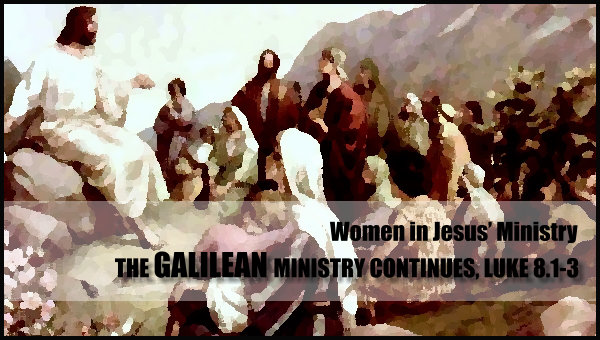By Tyson Thorne

The Galilean Ministry at Various Cities (4.14-9.50), 8.1-3
Luke takes a time-out to celebrate the benefactors of Jesus’ ministry, people whom many may be surprised to hear of. While Jesus traveled throughout Galilee with the 12 disciples, they were financed by a group of women, some known to us and some not. It specifically states these women provided for Jesus and his men out of their own means. This made me pause, as I’d always heard from the pulpit that women in first century Israel were oppressed and treated as property. Where did this idea come from? Certainly not from the pages of the Bible!
Both in his gospel and throughout the book of Acts Luke tells of prominent women who provided financial support not only for Jesus and the disciples, but the apostle Paul as well. In fact, in the book of Acts Women are mentioned specifically 20 times. From the outset we see women praying with the disciples in the upper room while awaiting the Spirit of God to come (Acts 1.14). In Acts 13.50 we see that “prominent women” were inclined against Paul, but later (17.12) in another city “prominent women” believed Paul’s message. Women were baptized (8.12), raised from the dead for their good works (9.36-42), owned their own businesses (such as Lydia, 16.40), served as missionaries aside their husbands (18.1-3), prophesied (21.8-9), and more.
Does this sound like oppression? Does it suggest women were treated as property? Yet I’ve heard this time and again in books, Bible studies and even from the pulpit. It is possible that women in the broader Roman Empire were treated poorly, but we know that in Israel, and what is today Turkey and other nations around the Mediterranean, that women could lead successful and independent lives. It is important that we have our understanding of the Biblical world shaped by Scripture itself rather than hearsay – no matter where it may come from.
There is a greater lesson to be learned here, however, about the role of women in ministry. Women are permitted to participate in worship, prayer, prophecy, tithing, missions, discipleship, baptism and more. Paul says as much both in his actions which we see in the book of Acts, and in his teachings. In 1 Corinthians 14 he outlines orderly worship. In verses 26 through 33 Paul details events that happen during a typical worship service, and there is no restriction against women in any of these things. Similarly, verses 37 through 40 also provide instruction to men and women alike.
The only restrictions Paul places on women in worship service in this passage are in verses 34, 35 and 36 and are often misunderstood. In context, Paul is talking about “orderly worship” and disorder could be caused by a woman attempting to ask her husband a question about what the speaker has said. This is due to the nature of early church meetings, which were patterned after Jewish synagogues whereby men sat together on one side, and women sat together on the other. It doesn’t take much imagination to see how disruptive a question could be in such an environment leading Paul to ban disruptive speech.
In fact, there is only one restriction of women in ministry that I can find in Scripture, a position we today call the “senior pastor” or “preaching pastor”. This is made clear in 1 Timothy chapter 2 and following. While women are to participate in church and learn alongside the men they are not to have authority (in the context this is spiritual authority) over men, which is a hallmark of the senior pastor today. Furthermore, the qualifications for spiritual authorities in the church are that they are to be men, the husband to but one wife, who have an orderly family life. There was no Sunday School in the early church and it is in fact a modern invention so this institution is not under the restrictions Paul teaches. Why this restriction is imposed is not due to cultural norms, either. Paul argues from Genesis to prove his point, but to pursue his reasoning on this topic is something that is outside our line of study here. Let it be sufficient to conclude that women were an important part of the ministry of our savior and continue in that tradition on up to modern times.
|
|